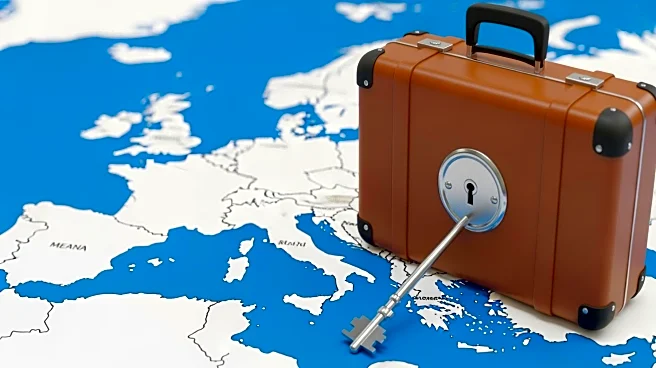What's Happening?
The European Union has reinforced its return and readmission policy as part of a comprehensive approach to migration management. This policy aims to ensure that EU countries effectively return third-country
nationals who have no legal right to stay in the EU, while also providing protection for those in need. The policy is implemented within the framework of the EU Charter of Fundamental Rights, ensuring respect for non-refoulement, access to asylum, and prohibition of collective expulsion. The Return Directive establishes common standards for the return of non-EU nationals staying irregularly in the EU, emphasizing voluntary departure and safeguarding basic rights such as access to healthcare and education for children. The EU has also proposed a new common approach on returns, which includes mutual recognition of return decisions and stricter rules to limit abuse and manage absconding.
Why It's Important?
The EU's return and readmission policy is crucial for maintaining the integrity of the Schengen area, which relies on effective external border management. By ensuring that individuals without legal status are returned, the policy aims to bolster public trust in the EU's ability to manage migration effectively. The policy also seeks to balance enforcement with human rights protections, providing a structured approach to voluntary return and reintegration. This is significant for EU countries as it helps manage migration flows and reduces the burden on national systems. The policy's emphasis on cooperation with non-EU countries for readmission further strengthens the EU's external migration management capabilities.
What's Next?
The EU is set to implement a new regulation that will streamline return procedures across member states, enhancing cooperation and operational efficiency. This includes the establishment of return hubs and a European Return Order system. The EU will continue to work closely with Frontex and member states to ensure seamless coordination and enhance operational support for returns. Additionally, the EU will intensify dialogue with partner countries to improve readmission cooperation, potentially linking visa policy to readmission agreements. These steps are expected to create a more coherent and effective system for managing irregular migration within the EU.
Beyond the Headlines
The EU's approach to migration management reflects broader ethical and legal considerations, balancing enforcement with the protection of human rights. The policy's focus on voluntary return and reintegration highlights the EU's commitment to humane migration practices. The integration of readmission agreements into broader international cooperation frameworks underscores the EU's strategic approach to migration policy, aiming to foster stability and development in partner countries. This comprehensive strategy may influence global migration management practices, setting a precedent for other regions facing similar challenges.










